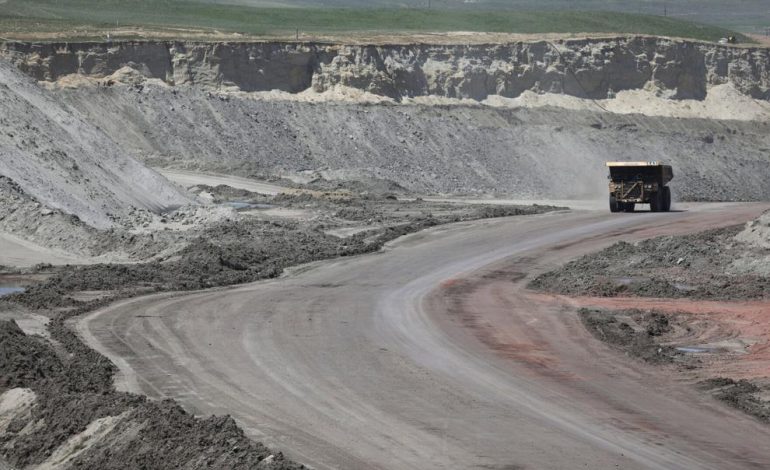Wyoming’s congressional delegation is celebrating a big procedural win in Washington, D.C., in its fight against a Biden-era ban on new federal coal leasing in northeast Wyoming’s Powder River Basin — home to some of the largest coal deposits and most productive mines in North America, Casper Star-Tribune reports.
But whether that victory actually leads to new, large coal leases anytime soon is far from clear. And the way Congress is going about it has conservation groups across the West furious.
The move centers on Joint Resolution 130, introduced in October by US Rep. Harriet Hageman and Sens. Cynthia Lummis and John Barrasso. The resolution has now passed both the US House and Senate.
Its target: the Bureau of Land Management’s Buffalo Field Office Resource Management Plan, updated in December, which effectively banned new federal coal leasing in parts of northeast Wyoming.
To overturn it, lawmakers are using a rarely deployed tool — the Congressional Review Act (CRA) — which lets Congress invalidate certain federal rules and planning decisions.
Wyoming’s all-Republican delegation says this is about energy, jobs and pushing back on what they call federal overreach.
“The Biden administration’s relentless war on American energy was waged at every level, including in Wyoming’s Powder River Basin, where it halted coal leasing,” Hageman wrote Tuesday on X. “Passing H.J. Res. 130 will restore our national energy dominance, protect Wyoming jobs and prosperity and reassert Congress’s authority over an unchecked administrative state.”
Gov. Mark Gordon also praised the move, calling the leasing ban “misguided” and highlighting what he sees as a bigger legacy of using the CRA.
“When signed by the President, this action ensures that no future federal administration can authorize the large-scale termination of coal leasing in the area,” Gordon said in a prepared statement.
The Biden administration has argued that the leasing ban won’t dramatically change coal’s near-term outlook. According to BLM’s own analysis, Powder River Basin mines already control enough permitted reserves to keep operating at current production levels well beyond 2040, even without new leases.
Most of that coal goes to the nation’s aging fleet of coal-fired power plants — a sector that’s been in long-term decline as utilities shift toward natural gas and renewables.
But Wyoming’s delegation — and previously, the Trump administration — point to surging demand for electricity, especially from artificial intelligence and large data centers, as a reason not to lock up future coal supplies.
Even if the legal door to leasing opens wider, recent history suggests companies aren’t exactly stampeding to grab more Powder River Basin coal.
In October, the BLM held a test-run coal lease sale in the Montana portion of the basin. It received just one bid — from Navajo Transitional Energy Company — for 167 million tons of coal. The offer? About $186,000, an unprecedented fraction of a penny per ton. Days later, the agency postponed another lease auction on the Wyoming side.
For critics of the leasing push, that sale tells the real story.
“It’s a sham,” said Lynne Huskinson, a former Powder River Basin coal miner and chair of the Powder River Basin Resource Council, a Sheridan-based landowner group. She argued the low bid wouldn’t even cover “a big repair” on one of the company’s motor graders, let alone signal strong demand for new coal.
To them, blaming Biden’s leasing ban for coal’s struggles is political theater more than economic reality.
The bigger fight isn’t just about coal — it’s about how decisions over public lands get made.
BLM resource management plans, like the one for the Buffalo Field Office, are built through a long, formal public process involving local governments, tribes, ranchers, industry, and conservation groups. They’re also the framework for “multiple use” — the idea that public lands should support a mix of activities: energy development, grazing, wildlife, recreation and more.
By using the Congressional Review Act to overturn these plans, critics say Congress is bulldozing years of local input and careful compromise with a one-size-fits-all political vote from Washington.
“Senators heard one consistent message today: Multiple-use is hard,” said Rachael Hamby, policy director at the Center for Western Priorities. “Finding the balance happens on the ground, with the residents, scientists and small-business owners who know the land the best. That’s why it’s so foolish for Congress to use a blunt instrument like the Congressional Review Act to impose land management decisions from Washington.”
Some conservation groups warn the tactic could even undermine other uses authorized under BLM plans, like grazing permits or oil and gas leases, by throwing those planning documents into legal limbo.
For now, Wyoming’s leaders are treating the CRA effort as a major defense of coal country and state sovereignty over energy production.
But the market reality is tougher to spin: coal demand is still uncertain, utilities are still transitioning away from it, and even when leases are offered, companies may not be eager to pay much for long-term rights.
Overturning the leasing ban might reopen the door on paper. Whether anyone walks through it — and at what price — is another question entirely.










The latest news in your social feeds
Subscribe to our social media platforms to stay tuned